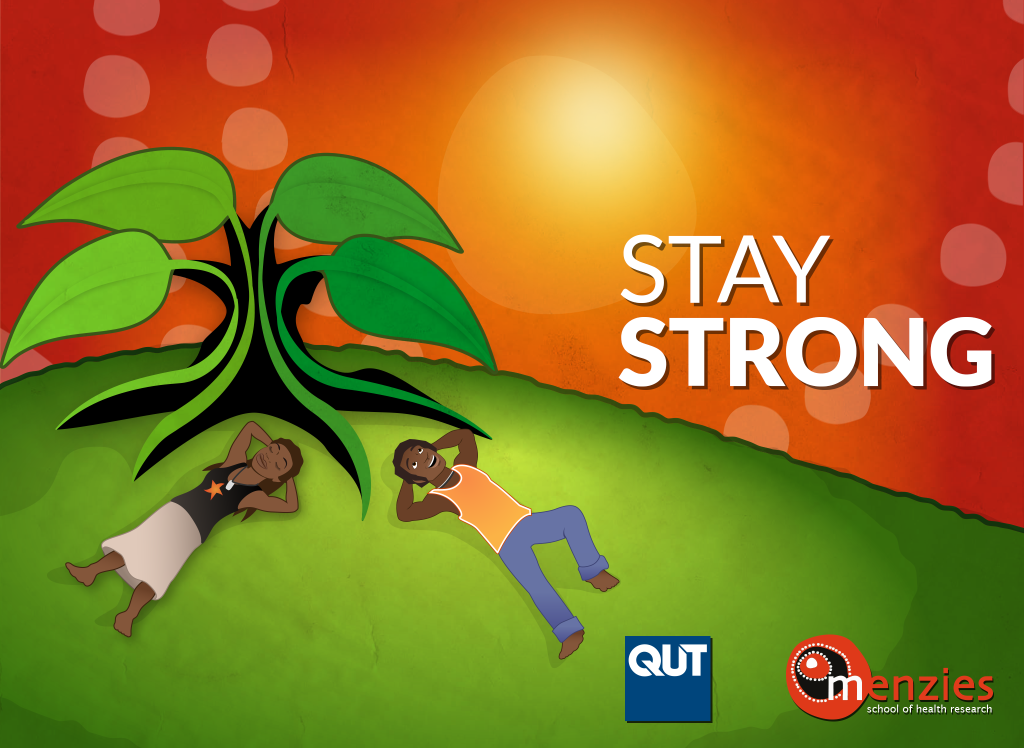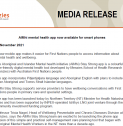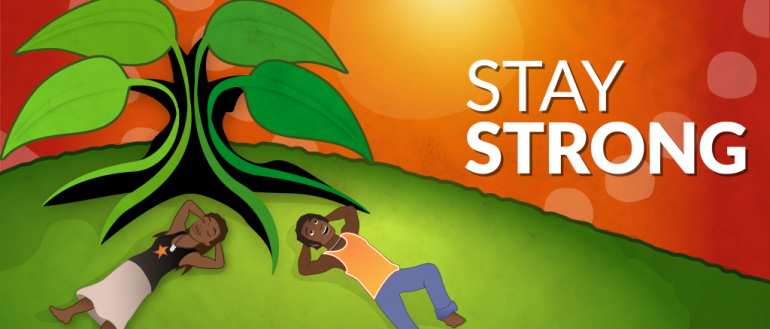Who is the AIMhi app for?
The AIMhi Stay Strong App is an innovative tool that addresses the mental health and wellbeing concerns of First Nations Australians using a cross-cultural approach. The app is based on more than 15 years of research and collaboration within the Aboriginal and Islander Mental Health Initiative (AIMhi). It is designed to promote wellbeing by reviewing strengths, worries and the goals or changes people would like to make in their lives.
The AIMhi Stay Strong App assists service providers to deliver cost-effective, evidence-based wellbeing interventions to First Nations clients. It is designed to provide an effective, visually appealing, culturally relevant, low-intensity intervention suitable for clinician supported delivery in a variety of primary care, specialist care and community settings.
Who developed the AIMhi app?
The AIMhi Stay Strong App was developed by Menzies School of Health Research, in partnership with Queensland University of Technology, through the translation of AIMhi care planning tools into a digital application.
 Watch demonstrations of the AIMhi Stay Strong App:
Watch demonstrations of the AIMhi Stay Strong App:
What does the app involve?
The app is designed to be used by service providers and clients in a client session. The app facilitates discussion about:
- Friends and family who help keep clients strong and healthy
- Personal strengths relating to spiritual and cultural, physical, family, social and work, and mental and emotional aspects of clients’ lives - represented visually as leaves on a tree
- Aspects of clients’ lives that take away their strength in the same four areas
- Setting client-driven goals for change to work on
- Plans for achieving their goals and steps towards goals
The app gives a visual representation of the areas in the client’s life where they are strong and the areas in their life where they are not as strong and assists clients in their plans for making change. The process is assisted and supported by help text and audio instructions. A summary of the Stay Strong Plan can then be exported, emailed and/or printed to keep a record of the session for clients and health providers. In subsequent sessions, the client’s goals and steps towards their goals can be reviewed. The app also includes an optional K5 and K10 assessment to measure psychological distress.
What is the evidence base for the AIMhi Stay Strong app?
The AIMhi approach has been tested and evaluated in a randomised controlled trial and qualitative studies. The trial showed that the AIMhi approach resulted in significant improvements in wellbeing, life skills, alcohol dependence and self-efficacy of First Nations clients with chronic mental illness, with changes sustained over time (18 months).
Our pilot testing study showed that the original AIMhi Stay Strong care planning tools translated easily into electronic format, providing an engaging approach to addressing mental health, wellbeing and substance misuse issues for First Nations clients. The electronic format is interactive and may help to overcome some of the barriers associated with a paper format in the context of low literacy and a history of institutionalisation. The developed intervention will assist services to deliver cost-effective, evidence-based holistic treatment. A randomised controlled trial testing the effectiveness of the Stay Strong App with renal patients found the app to be useful for reducing distress and depression among patients on haemodialysis who showed signs of distress or depression at the start of the study.
How does the AIMhi Stay Strong app complement practice?
While the AIMhi Stay Strong Care Plan is already being used by health and community services across Australia, the Stay Strong app provides a more engaging, client-friendly format. The app may complement aspects of client assessment and treatment. As part of the eMental Health in Practice (eMHPrac) project, we are providing training and support for organisations interested in using the app.
Feedback
We would appreciate any feedback on how the app could be improved.
Chief investigators:
Contact information:
Collaborators:
- Queensland University of Technology
- Giant Vision
- CAAMA
Acknowledgements:
Thanks to Giant Vision for producing the demonstration videos.
- AIMhi Stay Strong iPad App
- AIMhi Stay Strong Android App
- Brief Treatment Manual
- Stay Strong App User Guide
Watch demonstrations of the AIMhi Stay Strong App:
-

AIMhi mental health app now available for smart phones
The AIMhi Stay Strong app is a colourful, user-friendly digital mental health tool developed by Menzies with Australian First Nations people.
-

At Pioneer FC, suicide does discriminate
Gary Robinson, a suicide researcher at Menzies School of Health Research in Darwin, traces a wave of suicides that hit Western Australia’s Kimberley region in recent years to the arrival of alcohol and cash-based economies, and a breakdown of cultural authority structures
-
Tackling smoking in remote communities
The development of Yarning about Smoking is a collaboration between the Health Department’s Remote Alcohol and Other Drugs Workforce Program in Primary Health Care and the Menzies School of Health Research
-

Mental health app reaches out to Indigenous Australians
A pioneering iPad app which visually represents an individual’s strengths and weakness is hoping to significantly improve Indigenous mental health; one of the nation’s fastest growing health problems.
-

New app to improve Indigenous mental health featured on World Mental Health Day
An innovative iPad app based on tools developed by Indigenous people for Indigenous people is hoping to address one of the nation’s fastest growing health problems.
- Raphiphatthana, B., Sweet, M., Puszka, S., Dingwall, K. & Nagel, T. (2020). Evaluation of a three-phase implementation program in enhancing e-mental health adoption within Indigenous primary healthcare organisations. BMC Health Services Research, 20:576.
- Raphiphatthana, B., Sweet, M., Puszka, S., Whitty, M., Dingwall, K. & Nagel, T. (2020). Evaluation of Electronic Mental Health Implementation in Northern Territory Services Using the Integrated “Promoting Action on Research Implementation in Health Services” Framework: Qualitative Study. Journal of Medical Internet Research, 7, e14835. doi: 10.2196/14835. PMID: 32452812.
- Nagel, T., Sweet, M., Dingwall, K.M., Puszka, S., Hughes, J.T., Kavanagh, D.J., Cass, A., Howard, K. & Majoni, S.W. (2020). Adapting wellbeing research tools for Aboriginal and Torres Strait Islander people with chronic kidney disease. BMC Nephrology, 21, 130. https://doi.org/10.1186/s12882-020-01776-y
- Dingwall, K. M., Nagel, T., Hughes, J. T., Kavanagh, D. J., Cass, A., Howard, K., et al. (2019). Wellbeing intervention for chronic kidney disease (WICKD): A randomised controlled trial study protocol. BMC Psychology, 7(1), 1-7. doi: 10.1186/s40359-018-0264.
- Povey, J., Mills, P.P.J.R., Dingwall, K.M., Lowell, A., Singer,J., Rotumah, D., Bennett-Levy, J. & Nagel, T. (2016). Acceptability of mental health apps for Aboriginal and Torres Strait Islander Australians: A qualitative study. Journal of Medical Internet Research, 18(3): e65.
- Puszka, S., Dingwall, K., Sweet, M. & Nagel, T. (2016). E-mental health innovations for Aboriginal and Torres Strait Islander australians: a qualitative study of implementation needs in health services. JMIR Mental Health, 3(3): e43. doi: 10.2196/mental.5837.
- Dingwall, K., Puszka, S., Sweet, M. & Nagel, T. (2015). “Like drawing into sand”: Acceptability, feasibility and appropriateness of a new e-mental health resource for service providers working with Aboriginal and Torres Strait Islander people. Australian Psychologist, 50(1), 60-9. doi: 10.1111/ap.12100.
- Dingwall. K.M., Puszka, S., Sweet, M., Mills, P.P.J.R. & Nagel, T. (2015) Evaluation of a culturally adapted training course in Indigenous e-mental health. Australasian Psychiatry, 23(6), 630-5. doi: 10.1177/1039856215608282.


